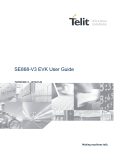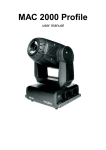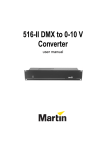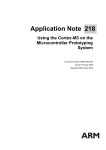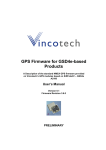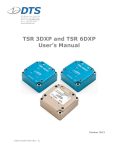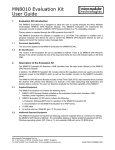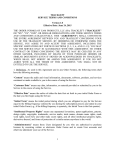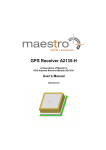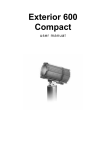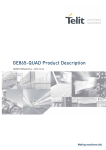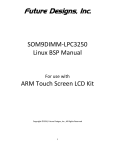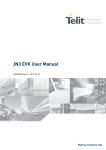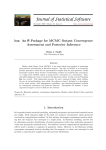Download SE873 EVK User Guide
Transcript
SE873 EVK User Guide 1VV0301214 r0 – 2015-07-29 SE873 Evaluation Kit User Guide 1VV0301214 r0 – 2015-07-29 APPLICABILITY TABLE PRODUCT SE873 EVK Reproduction forbidden without written authorization from Telit Communications S.p.A. - All Rights Reserved. Page 2 of 44 Mod. 0810 2011-07 Rev.2 SE873 Evaluation Kit User Guide 1VV0301214 r0 – 2015-07-29 SPECIFICATIONS SUBJECT TO CHANGE WITHOUT NOTICE Notice While reasonable efforts have been made to assure the accuracy of this document, Telit assumes no liability resulting from any inaccuracies or omissions in this document, or from use of the information obtained herein. The information in this document has been carefully checked and is believed to be entirely reliable. However, no responsibility is assumed for inaccuracies or omissions. Telit reserves the right to make changes to any products described herein and reserves the right to revise this document and to make changes from time to time in content hereof with no obligation to notify any person of revisions or changes. Telit does not assume any liability arising out of the application or use of any product, software, or circuit described herein; neither does it convey license under its patent rights or the rights of others. It is possible that this publication may contain references to, or information about Telit products (machines and programs), programming, or services that are not announced in your country. Such references or information must not be construed to mean that Telit intends to announce such Telit products, programming, or services in your country. Copyrights This instruction manual and the Telit products described in this instruction manual may be, include or describe copyrighted Telit material, such as computer programs stored in semiconductor memories or other media. Laws in the Italy and other countries preserve for Telit and its licensors certain exclusive rights for copyrighted material, including the exclusive right to copy, reproduce in any form, distribute and make derivative works of the copyrighted material. Accordingly, any copyrighted material of Telit and its licensors contained herein or in the Telit products described in this instruction manual may not be copied, reproduced, distributed, merged or modified in any manner without the express written permission of Telit. Furthermore, the purchase of Telit products shall not be deemed to grant either directly or by implication, estoppel, or otherwise, any license under the copyrights, patents or patent applications of Telit, as arises by operation of law in the sale of a product. Computer Software Copyrights The Telit and 3rd Party supplied Software (SW) products described in this instruction manual may include copyrighted Telit and other 3rd Party supplied computer programs stored in semiconductor memories or other media. Laws in the Italy and other countries preserve for Telit and other 3rd Party supplied SW certain exclusive rights for copyrighted computer programs, including the exclusive right to copy or reproduce in any form the copyrighted computer program. Accordingly, any copyrighted Telit or other 3rd Party supplied SW computer programs contained in the Telit products described in this instruction manual may not be copied (reverse engineered) or reproduced in any manner without the express written permission of Telit or the 3rd Party SW supplier. Furthermore, the purchase of Telit products shall not be deemed to grant either directly or by implication, estoppel, or otherwise, any license under the copyrights, patents or patent applications of Telit or other 3rd Party supplied SW, except for the normal non-exclusive, royalty free license to use that arises by operation of law in the sale of a product. Reproduction forbidden without written authorization from Telit Communications S.p.A. - All Rights Reserved. Page 3 of 44 Mod. 0810 2011-07 Rev.2 SE873 Evaluation Kit User Guide 1VV0301214 r0 – 2015-07-29 Usage and Disclosure Restrictions License Agreements The software described in this document is the property of Telit and its licensors. It is furnished by express license agreement only and may be used only in accordance with the terms of such an agreement. Copyrighted Materials Software and documentation are copyrighted materials. Making unauthorized copies is prohibited by law. No part of the software or documentation may be reproduced, transmitted, transcribed, stored in a retrieval system, or translated into any language or computer language, in any form or by any means, without prior written permission of Telit High Risk Materials Components, units, or third-party products used in the product described herein are NOT faulttolerant and are NOT designed, manufactured, or intended for use as on-line control equipment in the following hazardous environments requiring fail-safe controls: the operation of Nuclear Facilities, Aircraft Navigation or Aircraft Communication Systems, Air Traffic Control, Life Support, or Weapons Systems (High Risk Activities"). Telit and its supplier(s) specifically disclaim any expressed or implied warranty of fitness for such High Risk Activities. Trademarks TELIT and the Stylized T Logo are registered in Trademark Office. All other product or service names are the property of their respective owners. Third Party Rights The software may include Third Party Right software. In this case you agree to comply with all terms and conditions imposed on you in respect of such separate software. In addition to Third Party Terms, the disclaimer of warranty and limitation of liability provisions in this License shall apply to the Third Party Right software. TELIT HEREBY DISCLAIMS ANY AND ALL WARRANTIES EXPRESS OR IMPLIED FROM ANY THIRD PARTIES REGARDING ANY SEPARATE FILES, ANY THIRD PARTY MATERIALS INCLUDED IN THE SOFTWARE, ANY THIRD PARTY MATERIALS FROM WHICH THE SOFTWARE IS DERIVED (COLLECTIVELY “OTHER CODE”), AND THE USE OF ANY OR ALL THE OTHER CODE IN CONNECTION WITH THE SOFTWARE, INCLUDING (WITHOUT LIMITATION) ANY WARRANTIES OF SATISFACTORY QUALITY OR FITNESS FOR A PARTICULAR PURPOSE. NO THIRD PARTY LICENSORS OF OTHER CODE SHALL HAVE ANY LIABILITY FOR ANY DIRECT, INDIRECT, INCIDENTAL, SPECIAL, EXEMPLARY, OR CONSEQUENTIAL DAMAGES (INCLUDING WITHOUT LIMITATION LOST PROFITS), HOWEVER CAUSED AND WHETHER MADE UNDER CONTRACT, TORT OR OTHER LEGAL THEORY, ARISING IN ANY WAY OUT OF THE USE OR DISTRIBUTION OF THE OTHER CODE OR THE EXERCISE OF ANY RIGHTS GRANTED UNDER EITHER OR BOTH THIS LICENSE AND THE LEGAL TERMS APPLICABLE TO ANY SEPARATE FILES, EVEN IF ADVISED OF THE POSSIBILITY OF SUCH DAMAGES. Copyright © Telit Communications S.p.A. 2015. Reproduction forbidden without written authorization from Telit Communications S.p.A. - All Rights Reserved. Page 4 of 44 Mod. 0810 2011-07 Rev.2 SE873 Evaluation Kit User Guide 1VV0301214 r0 – 2015-07-29 Contents 1. Introduction........................................................................................................................ 8 1.1. Scope ............................................................................................................................ 8 1.2. Contact Information, Support ........................................................................................ 8 1.3. Text Conventions .......................................................................................................... 8 1.4. Related Documents ....................................................................................................... 9 2. Evaluation Kit Requirements .......................................................................................... 10 3. Evaluation Kit Description .............................................................................................. 11 4. 3.1. Evaluation Kit Contents ............................................................................................... 11 3.2. Evaluation Kit .............................................................................................................. 13 3.3. SE873 Module............................................................................................................. 14 3.4. Evaluation Board Picture ............................................................................................. 15 3.5. Evaluation Board Layout ............................................................................................. 16 3.6. Evaluation Board Schematic Diagram ......................................................................... 18 Evaluation Kit Setup ........................................................................................................ 19 4.1. Installing the USB Drivers ........................................................................................... 19 4.2. Installing SiRFLive ...................................................................................................... 21 5. Running the SE873 Evaluation Board............................................................................ 22 6. Using SiRFLive ................................................................................................................ 23 6.1. Starting SiRFLive ........................................................................................................ 23 6.2. SiRFLive Windows ...................................................................................................... 27 6.2.1. 6.2.2. 6.2.3. 6.2.4. Signal View ..................................................................................................................... 27 Radar View ..................................................................................................................... 28 Debug View .................................................................................................................... 29 Location View ................................................................................................................. 30 6.3. Logging Data ............................................................................................................... 31 6.4. Receiver Commands................................................................................................... 33 6.4.1. Reset commands ............................................................................................................ 34 Reproduction forbidden without written authorization from Telit Communications S.p.A. - All Rights Reserved. Page 5 of 44 Mod. 0810 2011-07 Rev.2 SE873 Evaluation Kit User Guide 1VV0301214 r0 – 2015-07-29 6.4.2. 6.4.3. 6.4.4. 6.4.5. 7. 8. 9. Switching Protocols......................................................................................................... 35 Setting the Receiver Type ............................................................................................... 36 Enabling 5Hz Update ...................................................................................................... 36 OSP MID 136 - Mode Control Command ........................................................................ 38 Updating Firmware with SiRFLive .................................................................................. 39 7.1. Flashing Requirements ............................................................................................... 39 7.2. Flashing Instructions ................................................................................................... 39 Software Interface ........................................................................................................... 41 8.1. NMEA Output Messages ........................................................................................... 41 8.2. NMEA Input Commands ........................................................................................... 43 8.3. One Socket Protocol (OSP) Output Messages ....................................................... 43 Document History ............................................................................................................ 44 Reproduction forbidden without written authorization from Telit Communications S.p.A. - All Rights Reserved. Page 6 of 44 Mod. 0810 2011-07 Rev.2 SE873 Evaluation Kit User Guide 1VV0301214 r0 – 2015-07-29 Figures Figure 3-1 SE873 Evaluation Kit Contents ....................................................................................... 11 Figure 3-2 SE873 Evaluation Kit........................................................................................................ 13 Figure 3-3 SE873 Module ................................................................................................................... 14 Figure 3-4 SE873 Evaluation Board .................................................................................................. 15 Figure 3-5 SE873 Evaluation Board Layout...................................................................................... 16 Figure 3-6 SE873 Evaluation Board Schematic Diagram ................................................................ 18 Figure 4-1 Hardware Installation ....................................................................................................... 19 Figure 4-2 Identify new COM port ..................................................................................................... 20 Figure 6-1 Connection settings window ........................................................................................... 23 Figure 6-2 Click Receiver, then Connect on the menu bar.............................................................. 24 Figure 6-3 Switch Comm Settings window....................................................................................... 24 Figure 6-4 The OSP protocol window ............................................................................................... 25 Figure 6-5 Features, Power Mode window ....................................................................................... 25 Figure 6-6 Full Power Mode window ................................................................................................. 26 Figure 6-7 Verify NMEA window........................................................................................................ 26 Figure 6-8 Satellite signal levels ....................................................................................................... 27 Figure 6-9 Satellites by azimuth and elevation ................................................................................ 28 Figure 6-10 Receiver Messages (OSP ) ............................................................................................ 29 Figure 6-11 Details of the position fix ............................................................................................... 30 Figure 6-12 Log File command.......................................................................................................... 31 Figure 6-13 Enter the filename to specify the log file ...................................................................... 32 Figure 6-14 Receiver commands ...................................................................................................... 33 Figure 6-15 Reset Window................................................................................................................. 34 Figure 6-16 Switching to OSP protocol with its default 115200 baud rate ..................................... 35 Figure 6-17 Click Receiver, Receiver Family, then the desired family ........................................... 36 Figure 6-18 Enable 5Hz Nav command ............................................................................................. 37 Figure 7-1 Firmware file selection..................................................................................................... 39 Figure 7-2 Select Firmware file ......................................................................................................... 40 Figure 7-3 Successful firmware installation ..................................................................................... 40 Tables Table 3-1 SE873 Evaluation Kit Contents ......................................................................................... 12 Table 3-2 SE873 Evaluation Board Components ............................................................................. 17 Table 6-1 MID 136 - Mode Control command ................................................................................... 38 Table 8-1 Default NMEA Output Messages ...................................................................................... 41 Table 8-2 Available Messages ........................................................................................................... 42 Table 8-3 NMEA Talker IDs ................................................................................................................ 42 Reproduction forbidden without written authorization from Telit Communications S.p.A. - All Rights Reserved. Page 7 of 44 Mod. 0810 2011-07 Rev.2 SE873 Evaluation Kit User Guide 1VV0301214 r0 – 2015-07-29 1. Introduction 1.1. Scope The scope of this manual is provide product information for the SE873 Evaluation Kit (EVK). 1.2. Contact Information, Support For general contact, technical support, to report documentation errors and to order manuals, contact Telit Technical Support Center (TTSC) at: [email protected] [email protected] [email protected] Alternatively, use: http://www.telit.com/en/products/technical-support-center/contact.php For detailed information about where you can buy the Telit modules or for recommendations on accessories and components visit: http://www.telit.com To register for product news and announcements or for product questions contact Telit Technical Support Center (TTSC). Our aim is to make this guide as helpful as possible. Keep us informed of your comments and suggestions for improvements. Telit appreciates feedback from the users of our information. 1.3. Text Conventions Danger – This information MUST be followed or catastrophic equipment failure or bodily injury may occur. Caution or Warning – Alerts the user to important points about integrating the module, if these points are not followed, the module and end user equipment may fail or malfunction. Tip or Information – Provides advice and suggestions that may be useful when integrating the module. All dates are in ISO 8601 format, i.e. YYYY-MM-DD. Reproduction forbidden without written authorization from Telit Communications S.p.A. - All Rights Reserved. Page 8 of 44 Mod. 0810 2011-07 Rev.2 SE873 Evaluation Kit User Guide 1VV0301214 r0 – 2015-07-29 1.4. Related Documents • SE873 Product User Guide Reproduction forbidden without written authorization from Telit Communications S.p.A. - All Rights Reserved. Page 9 of 44 Mod. 0810 2011-07 Rev.2 SE873 Evaluation Kit User Guide 1VV0301214 r0 – 2015-07-29 2. Evaluation Kit Requirements To use the SE873 Evaluation Kit (EVK), you will need: • USB Drivers (on the included flash drive) • SiRFLive 2.07P4 or later (on the included flash drive) • A PC with a USB port that fulfills the minimum software requirements: • Windows XP or later • NET Framework 2.0 (automatically installed by the SiRFLive package if necessary internet connection is required). Reproduction forbidden without written authorization from Telit Communications S.p.A. - All Rights Reserved. Page 10 of 44 Mod. 0810 2011-07 Rev.2 SE873 Evaluation Kit User Guide 1VV0301214 r0 – 2015-07-29 3. Evaluation Kit Description 3.1. Evaluation Kit Contents Note: The antenna is included but not visible under the ground plane. Figure 3-1 SE873 Evaluation Kit Contents Reproduction forbidden without written authorization from Telit Communications S.p.A. - All Rights Reserved. Page 11 of 44 Mod. 0810 2011-07 Rev.2 SE873 Evaluation Kit User Guide 1VV0301214 r0 – 2015-07-29 Evaluation Kit Contents Plastic case USB cable Multi-constellation antenna Ground Plane USB drive with software and documentation Evaluation Kit Table 3-1 SE873 Evaluation Kit Contents Reproduction forbidden without written authorization from Telit Communications S.p.A. - All Rights Reserved. Page 12 of 44 Mod. 0810 2011-07 Rev.2 SE873 Evaluation Kit User Guide 1VV0301214 r0 – 2015-07-29 3.2. Evaluation Kit Figure 3-2 SE873 Evaluation Kit Reproduction forbidden without written authorization from Telit Communications S.p.A. - All Rights Reserved. Page 13 of 44 Mod. 0810 2011-07 Rev.2 SE873 Evaluation Kit User Guide 1VV0301214 r0 – 2015-07-29 3.3. SE873 Module Figure 3-3 SE873 Module Reproduction forbidden without written authorization from Telit Communications S.p.A. - All Rights Reserved. Page 14 of 44 Mod. 0810 2011-07 Rev.2 SE873 Evaluation Kit User Guide 1VV0301214 r0 – 2015-07-29 3.4. Evaluation Board Picture Figure 3-4 SE873 Evaluation Board Reproduction forbidden without written authorization from Telit Communications S.p.A. - All Rights Reserved. Page 15 of 44 Mod. 0810 2011-07 Rev.2 SE873 Evaluation Kit User Guide 1VV0301214 r0 – 2015-07-29 3.5. Evaluation Board Layout Figure 3-5 SE873 Evaluation Board Layout Reproduction forbidden without written authorization from Telit Communications S.p.A. - All Rights Reserved. Page 16 of 44 Mod. 0810 2011-07 Rev.2 SE873 Evaluation Kit User Guide 1VV0301214 r0 – 2015-07-29 ID Description DL102 LED - System ON DL100 LED - 1PPS DL101 LED - TX data SW101 On/off switch – 1.8 V to module On/Off pin PL101 USB connector – Power, ground, Tx, and Rx S0100 SMA connector – 1PPS S0101 SMA connector - RF input PL102 1.8 V module power (current measurement) PL104 Boot pin to 1.8 V PL105 GPIO7 to ground PL106 3.3 V active antenna power (remove for passive antenna) PL107 TX output PL108 1PPS output PL109 1.8 V regulator enable PL110 3.3 V regulator enable PL111 1.8 V module regulator enable PL112 RX input PL114 GPIO6 pin to 1.8 V Table 3-2 SE873 Evaluation Board Components Reproduction forbidden without written authorization from Telit Communications S.p.A. - All Rights Reserved. Page 17 of 44 Mod. 0810 2011-07 Rev.2 SE873 Evaluation Kit User Guide 1VV0301214 r0 – 2015-07-29 3.6. Evaluation Board Schematic Diagram Figure 3-6 SE873 Evaluation Board Schematic Diagram Reproduction forbidden without written authorization from Telit Communications S.p.A. - All Rights Reserved. Page 18 of 44 Mod. 0810 2011-07 Rev.2 SE873 Evaluation Kit User Guide 1VV0301214 r0 – 2015-07-29 4. Evaluation Kit Setup 4.1. Installing the USB Drivers Before connecting the SE873 Evaluation Kit, install the necessary USB drivers. • Double-click the USB driver executable CDM v2.12.00 WHQL Certified.exe, and follow the directions to install the USB drivers. Figure 4-1 Hardware Installation • Click “Continue Anyway” to install the USB COM port driver • When the EVK board is connected to a personal computer USB port, the driver will create a COM port. • Use the Windows “Device Manager” to check the identification of the new COM port. This port identification is necessary for EVK tools to connect to the evaluation kit. Reproduction forbidden without written authorization from Telit Communications S.p.A. - All Rights Reserved. Page 19 of 44 Mod. 0810 2011-07 Rev.2 SE873 Evaluation Kit User Guide 1VV0301214 r0 – 2015-07-29 Figure 4-2 Identify new COM port • In this example, the COM port is assigned as COM5 Reproduction forbidden without written authorization from Telit Communications S.p.A. - All Rights Reserved. Page 20 of 44 Mod. 0810 2011-07 Rev.2 SE873 Evaluation Kit User Guide 1VV0301214 r0 – 2015-07-29 4.2. Installing SiRFLive Minimum PC requirements: • Pentium CPU 2 GHz • 1 GB of RAM • 100 MB hard drive Recommended: • 2 GB of RAM • 1280 x 1024 screen resolution Double-click the SiRFLiveInstaller_MKTG_Lite.msi file to install the SiRFLive program, then follow the installer directions until finished. It is recommended that SiRFLive be installed to the default location – C:\CSR\SiRFLive. Reproduction forbidden without written authorization from Telit Communications S.p.A. - All Rights Reserved. Page 21 of 44 Mod. 0810 2011-07 Rev.2 SE873 Evaluation Kit User Guide 1VV0301214 r0 – 2015-07-29 5. Running the SE873 Evaluation Board 1. Power will be applied to the SE873 module when the USB interface is connected to a USB port on a personal computer. When the EVK On-Off switch is turned ON, the module ON_OFF pin will be powered up and the module will begin operation. 2. Connect the provided GNSS Active Antenna. NOTE: The evaluation kit supplies 3.3V to the antenna. For a passive antenna, jumper PL106 must be removed. 3. Place the antenna face up in a location with a clear view of open sky. 4. Use SiRFLive or TelitView to send commands to and display output from the module. Reproduction forbidden without written authorization from Telit Communications S.p.A. - All Rights Reserved. Page 22 of 44 Mod. 0810 2011-07 Rev.2 SE873 Evaluation Kit User Guide 1VV0301214 r0 – 2015-07-29 6. Using SiRFLive 6.1. Starting SiRFLive 1. Connect Power and Antenna to the EVK. See Section 5 Running the SE873 Evaluation Board. 2. Turn on the EVK Power switch (up). 3. Launch the SiRFLive application. 4. Connection Settings window: Select the Receiver. This is where you select the COM port that was previously created by the USB driver. See Section 4.1 Installing the USB Drivers. Use the Receiver drop-down box. Figure 6-1 Connection settings window 5. If the default Baud Rate is 115200 and Protocol is OSP on your EVK, leave those boxes with their values as presented. If the default Baud Rate is 9600 and Protocol is NMEA on your EVK, change those boxes to match. If you have changed the receiver’s defaults, select them using the Baud Rate and Protocol drop-down boxes. Reproduction forbidden without written authorization from Telit Communications S.p.A. - All Rights Reserved. Page 23 of 44 Mod. 0810 2011-07 Rev.2 SE873 Evaluation Kit User Guide 1VV0301214 r0 – 2015-07-29 6. Click OK. The remainder of these screen captures will show NMEA protocol. OSP will present somewhat different data. 7. If necessary, click Receiver, then Connect on the menu bar. Figure 6-2 Click Receiver, then Connect on the menu bar 8. The SE873 defaults to a power-saving mode called SmartGNSS2, so you may see the GLONASS satellites disappear from the Radar View. This is normal. If you wish to command the full-time use of GLONASS as well as GPS, use the following procedure: a. Click Receiver, Command, then Switch Comm Settings. Figure 6-3 Switch Comm Settings window Reproduction forbidden without written authorization from Telit Communications S.p.A. - All Rights Reserved. Page 24 of 44 Mod. 0810 2011-07 Rev.2 SE873 Evaluation Kit User Guide 1VV0301214 r0 – 2015-07-29 b. Verify that Switch Protocol (to OSP) and Baud Rate of 115200 are selected as shown above. c. Click Set. The receiver and display will both switch to OSP protocol at 115,200 bps. Figure 6-4 The OSP protocol window d. Click Features, Power Mode, then Advanced. Figure 6-5 Features, Power Mode window Reproduction forbidden without written authorization from Telit Communications S.p.A. - All Rights Reserved. Page 25 of 44 Mod. 0810 2011-07 Rev.2 SE873 Evaluation Kit User Guide 1VV0301214 r0 – 2015-07-29 e. Verify that Full Power is selected, and click OK. Figure 6-6 Full Power Mode window f. To return to the NMEA display, click Receiver, Command, Switch Comm Settings Figure 6-7 Verify NMEA window Reproduction forbidden without written authorization from Telit Communications S.p.A. - All Rights Reserved. Page 26 of 44 Mod. 0810 2011-07 Rev.2 SE873 Evaluation Kit User Guide 1VV0301214 r0 – 2015-07-29 g. Verify NMEA at 9600 bps (or your desired rate), and click Set. 9. There are many additional functions available in SiRFLive. Please refer to the built-in User Manual for further details. Click Help in the Menu Bar, then User Manual. 6.2. SiRFLive Windows After a successful connection with the receiver is established, the default SiRFLive windows should be arranged and become filled with data. If not all the default windows are arranged or opened, under the Main Menu Bar, Click Window, Restore Layout, and Default. 6.2.1. Signal View (Tool Bar icon) Type of Fix Satellite Data Figure 6-8 Satellite signal levels Reproduction forbidden without written authorization from Telit Communications S.p.A. - All Rights Reserved. Page 27 of 44 Mod. 0810 2011-07 Rev.2 SE873 Evaluation Kit User Guide 1VV0301214 r0 – 2015-07-29 6.2.2. Radar View (Tool Bar icon) Green C/N0 = 0 C/N0 ≠ 0 and not used in the navigation l i C/N0 ≠ 0 and used in the navigation solution Skyblue SBAS Circle GPS Square GLONASS Orange ABP is being used to acquire satellites Purple CGEE is being used Pink SGEE is being used Red Blue Figure 6-9 Satellites by azimuth and elevation Reproduction forbidden without written authorization from Telit Communications S.p.A. - All Rights Reserved. Page 28 of 44 Mod. 0810 2011-07 Rev.2 SE873 Evaluation Kit User Guide 1VV0301214 r0 – 2015-07-29 6.2.3. Debug View (Tool Bar icon) Displays the messages incoming from the receiver Figure 6-10 Receiver Messages (OSP ) Reproduction forbidden without written authorization from Telit Communications S.p.A. - All Rights Reserved. Page 29 of 44 Mod. 0810 2011-07 Rev.2 SE873 Evaluation Kit User Guide 1VV0301214 r0 – 2015-07-29 6.2.4. Location View (Tool Bar icon) Map position button requires Internet access. Map Position Configuration Clear Data Set Reference Location Figure 6-11 Details of the position fix Reproduction forbidden without written authorization from Telit Communications S.p.A. - All Rights Reserved. Page 30 of 44 Mod. 0810 2011-07 Rev.2 SE873 Evaluation Kit User Guide 1VV0301214 r0 – 2015-07-29 6.3. Logging Data (Main Tool Bar icon) SiRFLive can record the current message stream (OSP or NMEA) into a log file. From the Menu Bar, click File, Log File, Start or click the Log File icon on the Tool Bar. Figure 6-12 Log File command Reproduction forbidden without written authorization from Telit Communications S.p.A. - All Rights Reserved. Page 31 of 44 Mod. 0810 2011-07 Rev.2 SE873 Evaluation Kit User Guide 1VV0301214 r0 – 2015-07-29 Enter the desired log file path and filename in the Log File Path box, as shown below, then click Start to begin logging. Figure 6-13 Enter the filename to specify the log file Reproduction forbidden without written authorization from Telit Communications S.p.A. - All Rights Reserved. Page 32 of 44 Mod. 0810 2011-07 Rev.2 SE873 Evaluation Kit User Guide 1VV0301214 r0 – 2015-07-29 6.4. Receiver Commands Many of the receiver commands can be accessed through the Menu Bar under Receiver, Command. There are also equivalent shortcuts on the Tool Bar for frequently used commands Figure 6-14 Receiver commands Some receiver commands are available in One Socket Protocol (OSP) only. Reproduction forbidden without written authorization from Telit Communications S.p.A. - All Rights Reserved. Page 33 of 44 Mod. 0810 2011-07 Rev.2 SE873 Evaluation Kit User Guide 1VV0301214 r0 – 2015-07-29 6.4.1. Reset commands (Tool Bar icon) Select from the Menu Bar Receiver, Command, Reset or click the Reset icon on the Tool Bar. Resets are used to measure the TTFF of the receiver. The TTFF/Nav Accuracy window conveniently displays the TTFF in seconds and Navigation accuracy based on the Reference Location. Reference Location allows the user to change the position used as the reference. This helps determine position accuracy in conjunction with Time-To-First-Fix values. Figure 6-15 Reset Window . Reproduction forbidden without written authorization from Telit Communications S.p.A. - All Rights Reserved. Page 34 of 44 Mod. 0810 2011-07 Rev.2 SE873 Evaluation Kit User Guide 1VV0301214 r0 – 2015-07-29 6.4.2. Switching Protocols On the Menu Bar, select Receiver, Command, Switch COMM Settings. Click Set to apply settings. OSP has many commands that are not available in NMEA. Therefore, switching to OSP is recommended for testing purposes. Figure 6-16 Switching to OSP protocol with its default 115200 baud rate Reproduction forbidden without written authorization from Telit Communications S.p.A. - All Rights Reserved. Page 35 of 44 Mod. 0810 2011-07 Rev.2 SE873 Evaluation Kit User Guide 1VV0301214 r0 – 2015-07-29 6.4.3. Setting the Receiver Type SiRFLive will normally auto-detect the connected chipset, but if not, click Receiver, Receiver Family, then the desired family. Figure 6-17 Click Receiver, Receiver Family, then the desired family 6.4.4. Enabling 5Hz Update First, set the baud rate high enough so that characters are not dropped. The default rates (9600 for NMEA and 115.200 for OSP) may be too low depending on the configured message set. Through the SiRFLive Menu Bar, click Receiver, Navigation, Set 5Hz Nav and select Enable 5Hz Nav. Reproduction forbidden without written authorization from Telit Communications S.p.A. - All Rights Reserved. Page 36 of 44 Mod. 0810 2011-07 Rev.2 SE873 Evaluation Kit User Guide 1VV0301214 r0 – 2015-07-29 Figure 6-18 Enable 5Hz Nav command The Enable 5Hz Nav command in SiRFLive sends the following OSP: A0 A2 00 0E 88 00 00 04 04 00 00 00 00 00 00 00 0F 02 00 A1 B0 B3 The Disable 5Hz Nav command in SiRFLive sends the following OSP: A0 A2 00 0E 88 00 00 04 00 00 00 00 00 00 00 00 0F 02 00 9D B0 B3 Reproduction forbidden without written authorization from Telit Communications S.p.A. - All Rights Reserved. Page 37 of 44 Mod. 0810 2011-07 Rev.2 SE873 Evaluation Kit User Guide 1VV0301214 r0 – 2015-07-29 6.4.5. Name OSP MID 136 - Mode Control Command Bytes Binary (Hex) Scale Unit Description Example Message ID 1U 88 Decimal 136 Reserved 2U 0000 Reserved Degraded Mode 1U 01 Controls use of 2-SV and 1-SV solutions Position Calc Mode 1U 01 xxxx xxx0 = ABP, OFF xxxx xxx1 = ABP, ON xxxx xx0x = Reverse EE OFF xxxx xx1x = Reverse EE ON xxxx x0xx = 5Hz nav update OFF xxxx x1xx = 5Hz nav update ON xxxx 0xxx = SBAS Ranging use OFF xxxx 1xxx = SBAS Ranging use ON Reserved 1U 00 Reserved Altitude 2S 0000 Alt Hold Mode 1U 00 Controls use of 3-SV solution Alt Hold Source 1U 00 0 = Use last computed altitude 1 = User user-input altitude Reserved 1U 00 Reserved Degraded Time Out 1U 05 sec 0 = disable degraded mode, 1 to 120 seconds degraded mode time limit DR Time Out 1U 02 sec 0 = disable dead reckoning, 1 to 120 seconds dead reckoning mode time limit Measurement and Track Smoothing 1U 00000011 meters User specified altitude, range - 1,000 to 10,000 xxxxxxx0 = disable track smoothing xxxxxxx1 = enable track smoothing xxxxxx0x = use raw measurements xxxxxx1x = use smooth measurements Table 6-1 MID 136 - Mode Control command Reproduction forbidden without written authorization from Telit Communications S.p.A. - All Rights Reserved. Page 38 of 44 Mod. 0810 2011-07 Rev.2 SE873 Evaluation Kit User Guide 1VV0301214 r0 – 2015-07-29 7. Updating Firmware with SiRFLive 7.1. Flashing Requirements Personal Computer with a USB/COM port running SiRFLive Firmware file 7.2. Flashing Instructions Click on Receiver, Update Firmware from the Menu Bar. Figure 7-1 Firmware file selection Reproduction forbidden without written authorization from Telit Communications S.p.A. - All Rights Reserved. Page 39 of 44 Mod. 0810 2011-07 Rev.2 SE873 Evaluation Kit User Guide 1VV0301214 r0 – 2015-07-29 Enter the filename or browse to the firmware file. Figure 7-2 Select Firmware file Click Update. Figure 7-3 Successful firmware installation The new firmware will be installed, and the receiver will begin operation. Reproduction forbidden without written authorization from Telit Communications S.p.A. - All Rights Reserved. Page 40 of 44 Mod. 0810 2011-07 Rev.2 SE873 Evaluation Kit User Guide 1VV0301214 r0 – 2015-07-29 8. Software Interface The host serial I/O port (UART, I2C, or SPI) supports full duplex communication between the receiver and the user. The default UART configuration is: NMEA, 9600 bps, 8 data bits, no parity, and 1 stop bit. Two protocols are available for data output and command input: • NMEA-0183 V4.10 • SiRF One Socket Protocol (OSP) More information regarding the software interface can be found in the Telit CSR Software User Guide. Access to this document requires a Non-Disclosure Agreement (NDA) with Telit. 8.1. NMEA Output Messages Defaults: • NMEA-0183 • 1 Hz fix rate. Maximum is 5 Hz. • Message Set Standard Messages Message ID Description Frequency RMC GNSS Recommended minimum navigation data 1 GGA GNSS position fix data 1 GSA GNSS Dilution of Precision (DOP) and active satellites 1 GSV GNSS satellites in view. Note: Multiple GSA and GSV messages may be output per cycle. Table 8-1 Default NMEA Output Messages Reproduction forbidden without written authorization from Telit Communications S.p.A. - All Rights Reserved. Page 41 of 44 Mod. 0810 2011-07 Rev.2 1/5 SE873 Evaluation Kit User Guide 1VV0301214 r0 – 2015-07-29 The following messages can be enabled by command: Message ID Description GLL Geographic Position – Latitude & Longitude GNS GNSS Fix Data VTG Course Over Ground & Ground Speed Table 8-2 Available Messages Talker ID Constellation GA Galileo GB BeiDou GL GLONASS GP GPS GN Solutions using multiple constellations Table 8-3 NMEA Talker IDs Proprietary Messages The receiver can issue several proprietary NMEA output messages ($PSRF) which report additional receiver data and status information. Reproduction forbidden without written authorization from Telit Communications S.p.A. - All Rights Reserved. Page 42 of 44 Mod. 0810 2011-07 Rev.2 SE873 Evaluation Kit User Guide 1VV0301214 r0 – 2015-07-29 8.2. NMEA Input Commands The receiver uses NMEA proprietary messages for commands and command responses. This interface provides configuration and control over selected firmware features and operational properties of the module. The format of a command is: $<command-ID>[,<parameters>]*<cr><lf> Commands are NMEA proprietary format and begin with “$PSRF”. Parameters, if present, are comma-delimited as specified in the NMEA 8.3. One Socket Protocol (OSP) Output Messages SiRF One Socket Protocol (OSP) is supported. This is an extension of the existing SiRF Binary protocol. The following messages are output once per second: − MID 2 − MID 3 − MID 4 − MID 7 − MID 9 − MID 41 − MID 64 SUB ID 2 (One message for each satellite being tracked). − MID 138 Reproduction forbidden without written authorization from Telit Communications S.p.A. - All Rights Reserved. Page 43 of 44 Mod. 0810 2011-07 Rev.2 SE873 Evaluation Kit User Guide 1VV0301214 r0 – 2015-07-29 9. Document History Revision 0 Date Changes 2015-07-29 First Issue Reproduction forbidden without written authorization from Telit Communications S.p.A. - All Rights Reserved. Page 44 of 44 Mod. 0810 2011-07 Rev.2












































